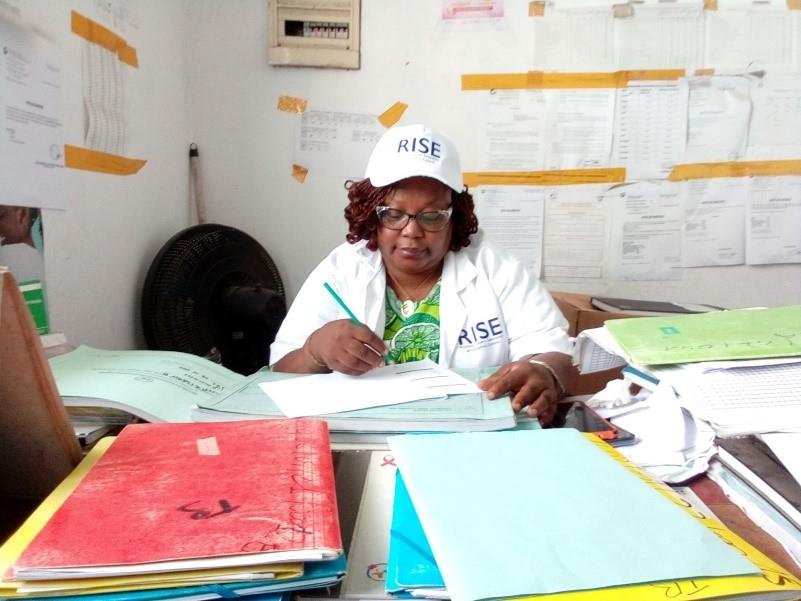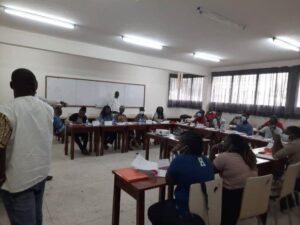The COVID-19 pandemic has interfered with primary health care across the world, not just by overwhelming health care systems, but also by leading people to delay seeking care. This was the case with Kouame.* “At the beginning of October 2022, I started having a fever every night and then a cough and finally I couldn’t breathe well,” said the taxi driver from Koumassi, Cote D’Ivoire. “So, I was sure I had COVID-19.”
Kouame sought out medicine to treat his symptoms from a community health worker trained by USAID’s Reaching Impact Saturation and Epidemic Control (RISE) project, Dorcas Kangah. She met Kouame on one of her rounds in her catchment area.
Recognizing that fever and cough could be symptomatic of another infectious disease, Mrs. Dorcas doubted that Kouame’s self-diagnosis was correct. She suspected that he had tuberculosis, and worried about HIV, since Kouame did not know his status. Mrs. Dorcas encouraged Kouame to come visit the tuberculosis center in Koumassi where she works.

“Mrs. Dorcas,” as she is known, encourages people in her community to get tested for HIV, and supports people living with HIV to stay on their treatment regimes.
“It is in this center that the counsellor carried out TB screening and HIV testing,” shared Kouame.
The RISE project, funded by PEPFAR (President’s Emergency Plan for AIDS Relief) through USAID, works in clinical and community settings to meet the United Nation’s 95–95–95 HIV goal for nations, which calls for 95% of people living with HIV or highly at risk of infection to know their HIV status, start antiretroviral treatment and be virally suppressed, meaning that their HIV is untransmissible.
This year, RISE has expanded to directly support comprehensive HIV testing, care, and treatment services at the facility level in the Abidjan 2 health zone, working with 73 health facilities there, including 44 high volume facilities. Since July 2020, community health workers such as Mrs. Dorcas have served as the frontline providers of those services.
Through her professional development and training, Mrs. Dorcas knows that between 36–40% of tuberculosis cases in Cote d’Ivoire occur in people living with HIV, and HIV remains the most important risk factor for the development of tuberculosis. This opportunistic infection is the primary cause of death of people living with HIV in Côte d’Ivoire, as tuberculosis and HIV form a “lethal duo” in which each accelerates the evolution of the other.
That is why Mrs. Dorcas was so pleased that Kouame followed her advice to seek testing for both.
At the health center, Mrs. Dorcas used a tuberculosis symptom-screening questionnaire. Based on Kouame’s answers she referred him to the laboratory for sampling and sputum analysis, the results of which confirmed Mrs. Dorcas’ suspicion. Kouame had tuberculosis, not COVID-19. The community counsellor further suggested routine HIV testing, which also came back positive. Kouame was immediately started on anti-tuberculosis treatment and two weeks later he was able to begin antiretroviral treatment for HIV. “After the first two months of treatment, I am breathing well now and my fever is totally gone,” said Kouame. “I thank the staff of the health center, especially my community counsellor with whom I am in contact.”
RISE in Cote d’Ivoire provides counsellors like Mrs. Dorcas with telephones for follow-up of client
appointments, to confirm clients are getting medication refills and remaining on treatments for both HIV and tuberculosis, and to confirm follow-up assessments. USAID’s RISE project has trained 70 community advisors on HIV prevention, 40 community health workers on HIV. One-hundred twenty-one community counselors have been trained on index testing, and infection prevention. Community counselors are invaluable assets to their communities, providing psychosocial support and championing clients to take charge of their health and that of their families.

The goals of RISE for the year include improving access to and uptake of HIV testing services, and promptly initiating antiretroviral treatment for those who have a positive test result. Aiding clients to remain in HIV care and treatment continues to be a challenge for the country to meet the UNAIDS third 95 goal of viral suppression. RISE-supported providers continue to identify people living with HIV who have tuberculosis, and link them to immediate care utilizing both clinical and non-clinical interventions.
RISE in Cote d’Ivoire ensures that all people living with HIV who visit a RISE-supported clinic are warmly welcomed with quality care and personalized assistance. All clients are followed by the same community counselor both in the clinic and in the community, creating continuity of care for health visits. In 2023, the results so far from four months of facility-level service delivery include 1,550 people diagnosed with HIV and started on antiretroviral treatment. Since October 2022, RISE is providing advice and expertise in research-based methods for HIV care, with practices for both in-clinic care and community-level outreach to clients. In this way, the expertise of RISE has reached 47,809 people living with HIV in 73 health centers, including 21 tuberculosis centers.
“I feel better since the beginning of treatment. Before I couldn’t even carry a bucket of water to wash myself. But since I started the treatment I am able to wash myself,” said Kouame, who continues to receive follow-up care at the RISE-supported clinic. “I even sent two sick friends who had a cough like mine, but had never visited the Tuberculosis Center. They came and have been consulted.”
*Name changed for confidentiality.



